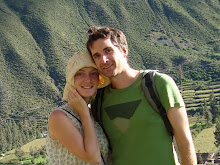I'm nearing the end of a pretty long day in Santo Domingo, the capital of the Dominican Republic. I'm writing up interviews from my trip last week to see banana farmers in the northwest of the country. I'm sure I'll receive little sympathy as it's about time I did some work!
The last few days have been really inspiring and moving - a group of fair trade banana farmers with small plots of land in the north west of the country are able to keep farming and are investing in their communities. They're keeping schools going that otherwise would have been closed or fallen down.
The little girl on the right in this photo, Nana, is 11 years old. She was found in the road by people who work at Banelino. She wasn't given any milk as a baby so her bones didn't develop and she couldn't walk. She now goes to school every day and is fed and is improving slowly.
They're also providing mobile health clinics to people who otherwise wouldn't have any access to medicine - preventative or treatment. They're giving talks and tests for HIV, vaccinating, training local facilitators to work in the communities and providing free prescriptions.
The communities are called 'bateys' - they were built by the United Fruit Company/Chiquita when they operated in the region before heading off in the '50s. All the houses are crumbling now, there are no sewerage works or services of any kind (the electricity is no longer connected). The water is dirty so people are ill.
This a man called Manuel heading to the mobile clinic. What a character!
This toddlers are queuing up to go in for lunch at a day centre where they're looked after and fed three meals a day, without it most of them wouldn't be fed properly. This photo makes me want to cry. They live in a really poor rural area with lots of social problems and many are neglected by their parents. On a lighter note, lots of women spend the day with their hair in rollers here!

Worms in the organic compost they're producing for the farms
The colonial part of Santo Domingo is beautiful - squares with gorgeous old stone churches and streets filled with colourful art for sale. The photo below is the view from my hotel room window! Don't like to risk heading out with my camera as I need it for work tomorrow and I attract so much attention here. 'Hey, lady, you want taxi' or hissing at me like a cat - not a lot of fun. It seems to be better when I wear sunglasses though I've discovered today!
Off to visit more banana farmers in another part of the island tomorrow.























.jpg)


















